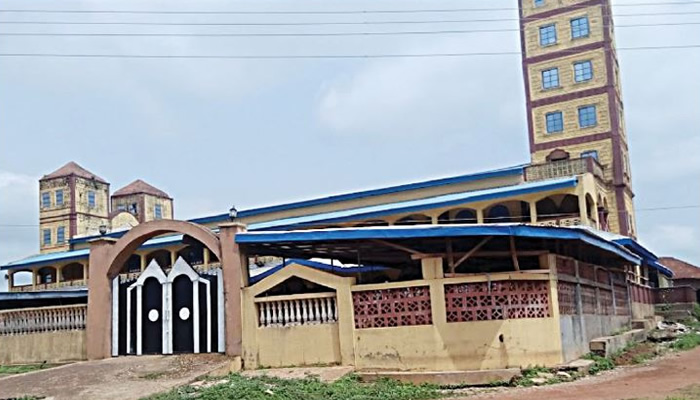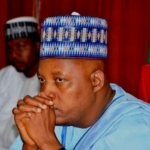
BOLA BAMIGBOLA writes on the crisis rocking the Muslim community in Inisa, Osun State, which has resulted in the shutting down of the central mosque following disagreements over the appointment of the chief imam
The unrest within the Muslim community in Inisa, Osun State, which started in the year 2020 caused by the struggle to fill the vacant position of the Chief Imam for the town’s central mosque recently became public knowledge when a video about it was posted on social media.
Until the video recorded inside the mosque was shared on the Facebook page of Sheik Hamad Labeeb, an Islamic cleric from Ilorin, Kwara State, most people outside the community did not appreciate the enormity of the crisis ravaging the town over the vacant stool of the chief imam.
In the viral video, Labeeb and members of his team were seen lamenting the shutdown of the mosque because two groups were fighting to occupy the stool of the chief imam and demanded immediate reopening of the building for prayers.
Checks by the Sunday PUNCH indicate that in the crisis which is already subject to litigation before an Osun State High Court in Osogbo are two groups backing individuals put forward to fill the post of chief imam following the death of the last three occupants of the position in the space of four months.
One of the groups believes that beyond succession arrangement, to occupy the position of chief imam, sound knowledge of Islam should be the main qualification. As a result, clerics in the group queued behind an Osogbo-based scholar and indigene of Inisa, Alhaji Ibrahim Oladejo.
This group was pushing for restructuring of the old order as part of measures to put Islam in the town in line with global best practices as embraced in other parts of the world.
But the second group was opposed to that idea. Those in the group were of the view that a cleric based in the town, Sheikh Muhammadu Jamiu Abdulhakeem, said to be next in line to the last occupier of the position, should be made imam in strict adherence to convention.
Imams, peacemaker’s death
The death of Imam Surakat Asiyanbi sometime in August 2022 after years of being indisposed laid the foundation for the crisis. Asiyanbi, an octogenarian, was said to have stopped attending Jumaat service for years on account of ill health.
Upon his demise, his deputy, Sheikh Mohammadu Qozeem Adediji, who acted for over a decade when Asiyanbi was indisposed, was elevated to the position of chief imam. Sources close to the circle of League of Imams and Alfas in the town said both Asiyanbi and Adediji were around the same age.
Suspicion, however, crept in following alleged haste in the appointment of Adediji. He was said to have been elevated to the post of imam a day after the burial of his predecessor and to the chagrin of a section in the league.
Fifteen days after the death of his predecessor, it was gathered that Adediji also died after failing to recover from an undisclosed sickness.
Before he died, he was said to have led Jumaat prayer just once as an imam in the mosque.
But before the only Jumaat prayer led by Adediji, some yet-to-be-identified people allegedly wrote on the wall of the mosque an inscription in Yoruba language translated as, ‘Pray in this mosque and die’.
The death of Adediji thus brought into the open the growing discontent in the rank of members of the League of Imams and Alfas in the town and heightened the suspicion among members of the group, with some blaming the death on spiritual attacks.
After Adediji’s interment, the next person to him, Sheikh Mustapha Baruwa, who was also said to be indisposed, did not even lead any Jumaat prayer. In his absence, the then-number four in rank, Sheikh Abdulhakeem, led prayers.
But while Baruwa was indisposed, it was gathered that the league resolved and chose Oladejo, a scholar from the town, who is resident in Osogbo, as the deputy imam.
The crisis over the stool festered when after the death of Baruwa, the chosen deputy who had yet to officially assume the position, was prevented by some clerics from becoming the imam. Those opposed to his choice argued that Abdulhakeem, who is next in the succession line and had acted as imam, should be elevated to the position instead of bringing a new person.
A cleric based in town, simply identified as Alfa Saeed, who claimed not to be supporting either of the groups in the crisis, in an interview with Sunday PUNCH, while tracing the genesis of the crisis, said, “In August 2020, the Chief Imam of Inisa, Sheik Surakat Asiyanbi, died. He died on a Thursday and we buried him on Friday.
“On Saturday, some people called a meeting in the central mosque. Some of those invited initially thought the meeting was about arrangements for the final outing for Asiyanbi. But at the meeting, the convener said another chief imam had emerged. They picked the person who would succeed the late imam and he was the deputy imam.
“Some people asked them how they went about the decision in such haste and without carrying others who should know about such an important issue along.
“Meanwhile, the person they picked as the next imam, Sheikh Mohammadu Qozeem Adediji, had already been performing as the acting imam because his predecessor was indisposed for about 11 years and couldn’t lead the congregation in Jumaat prayers.
“After the initial disagreement had been resolved, those behind the decision to quickly fill the vacant post turbaned Adediji as imam without inviting some clerics to partake in the ceremony. It was done quietly. Many people didn’t know about it until the eight-day Fidau prayer for the late Imam Asiyanbi.
“At that point, factions started emerging from the League of Imams and Alfas in the town. To add fuel to the brewing crisis, Adediji died 15 days after his predecessor’s demise. He became ill and failed to recover. Both Imam Asiyanbi and Adediji were in their 80s when they died.
“Adediji led Jumaat service just once before he died. People read different meanings to his death because some unknown people went inside the Inisa Central Mosque and wrote in Yoruba, ‘Kirun ko ku’, which means, ‘Pray in this mosque and die’.“
Saeed added, “Before the only Jumaat service he led as imam, security had to be provided because of the fear that those who wrote the threat message inside the mosque had created. After the death of Adediji, the next person in line, Sheikh Mustapha Baruwa, also in his 80s, was to fill the position. But he also died without leading a single Jumaat prayer.
“Before the death of Baruwa, those clerics had already picked Alhaji Ibrahim Oladejo, an indigene of the town who is a scholar and resides in Osogbo, as deputy imam. In Baruwa’s absence, the next in the succession line, Abdulhakeem, led the congregation in Jumaat since the man picked as the deputy imam, Oladejo, had not officially assumed the position,
“After the death of the third chief imam (Baruwa), some people expected Oladejo to be elevated to the office of and lead the congregation but some people in the town, including the Olunisa of Inisa, Oba Joseph Fasikun, felt that Abdulhakeem should continue leading the mosque as the imam notwithstanding the appointment of Oladejo.
“At that point, two factions had emerged. While some people supported Abdulhakeem to continue in office in line with the succession practice, others who desired to restructure the old order thought that Oladejo, with his knowledge and exposure, possessed a better pedigree to fill the office of imam.”
Peacemaker also dies
The death of another prominent indigene of the town that was blamed on the tussle over the post of chief imam was that of the Eesa of Inisa, Chief Enoch Ajiboso.
Ajiboso, sometime in December 2020, joined Olunisa, Oba Joseph Oyedele, in his palace alongside other chiefs to resolve the crisis. But while speaking, Ajiboso reportedly slumped and was rushed out.
He was eventually pronounced dead by doctors at the hospital.
Parties in court, mosque shut
Sequel to the move by backers of Abdulhakeem to stop the deputy imam from assuming the office of imam, those in support of Oladejo approached an Osun State High Court sitting in Osogbo to seek redress.
While the case was going on, the crisis took a violent dimension following an attack on Sheikh Abdulhakeem during a Jumaat prayer, which forced the administration of the immediate past governor of the state, Adegboyega Oyetola, to shut the mosque. Although the mosque was reopened, parties to the crisis refused to embrace the peace and stuck to their different positions.
Since then, the crisis has defied all solutions as the mosque has been abandoned by all parties, who are waiting for the court to give judgment on the matter.
Stating his own side of the story, Oba Oyedele said he was not involved in the crisis, adding that he gave an assignment regarding the resolution of the disagreement to the leadership of the League of Imams and Alfas in the town.
The monarch, who responded to the allegations against him while receiving a team led by Imam Abdullahi Oyewale Olohun-lo-merue of the Council for Islamic Preachers in Yorubaland during the meeting held in his palace, which also had in attendance representatives of Osun League of Imams and Alfas, Concerned Yoruba Muslim Scholars of Nigeria, and the visiting Sheikh Hamad Labeeb, explained in a video obtained by our correspondent that an imam appointed by the congregation was presented to him and he accepted him.
He also denied shutting down the mosque, noting that it was closed due to a case instituted on the leadership tussle.
Oba Oyedele also said inquiries were made by security agents and different groups, noting that a minority group that took the matter to court should be held responsible for the closure of the mosque.
He said, “Regarding the court case, a minority group instituted the case. They are the ones using the court. When the crises started, I deliberately did not get involved. I told the League of Imams and Alfas to take over the matter. I am happy they did well.
“They investigated and did what they were supposed to do. About three to four different inquiries were carried out, but this minority group knew that when the reports of the investigations were released, it would not be in their favour and they resorted to litigation. The first matter was filed.
“The Commissioner of Police in Osogbo and the League of Imams conducted different investigations into the crisis. The League of Imams in Osun North East also did its inquiry and all reports of the investigations did not go down well with the minority group. A professor from OAU, who is the chief imam, also did his inquiry and the report was about being released when the minority group instituted the second case.
“They stopped the first case and instituted another one. What that group saw and didn’t like is that the imam that was installed and presented to me by Ratibi was accepted by many people. If I had been informed earlier, I would have advised you to allow the two groups to observe prayers in different mosques while you monitor to see who has more followers.
“The imam, whom we installed, is leading prayers till now. Everything that has to do with Islam, he is the one representing the community. He has many people worshipping in his mosque. Those opposed to him are just after the closure of the central mosque. If you know what to do to bring the two groups together and resolve the crisis, I wish you success. I didn’t shut the mosque.”
Speaking on the interventions by the various groups to return peace to the Muslim community in Inisa, the Publicity Secretary of Concerned Yoruba Muslim Scholars of Nigeria, AbdulGanniy Ezrea, harped on the need for the parties to embrace peace.
Ezrea, who said Jummat prayers would be held at the central mosque henceforth, called for the cooperation of all stakeholders to end the imbroglio.





